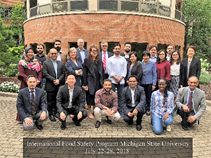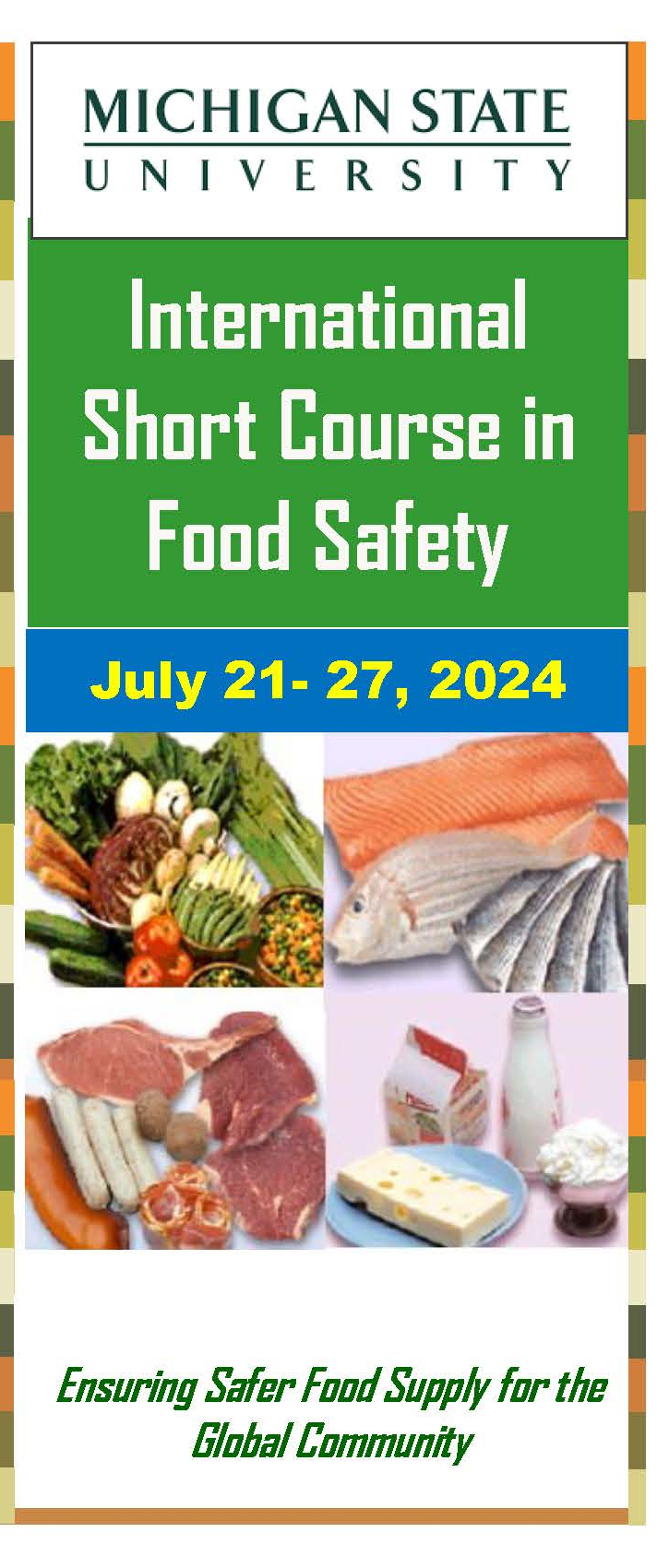International Short Course in Food Safety
Dates: July 21 - 27, 2024
Application deadline: May 21, 2024
Download: Brochure (pdf)
Download: Registration form (pdf)
(Contact the program manager for the fee.)
Program Rationale
 Consumers all over the world are becoming increasingly concerned about the safety of food. Recent outbreak cases related to food safety have added to these concerns. Globally, people are not only demanding more food, but also a safe supply of food. Globalization of the food supply has increased the risk of spreading food-borne diseases internationally. Food safety issues are thus increasingly tied to global trade agreements and are the most important cause of non-tariff trade barriers. Public concern towards the residues of pesticides used in agriculture and food production has led to changes in pesticide use and environmental policies worldwide. These policy changes are also driven by safety issues. For example, recently passed Food Quality Protection Act (FQPA) in the U.S. demands new standards for pesticide residue tolerances in raw and processed foods. Food Safety issues are also controversial for the products developed through genetic engineering and biotechnology. In addition, new safety standards are being considered for the food produced through organic agriculture. The US has recently adapted Food Safety Modernization Act (2011).
Consumers all over the world are becoming increasingly concerned about the safety of food. Recent outbreak cases related to food safety have added to these concerns. Globally, people are not only demanding more food, but also a safe supply of food. Globalization of the food supply has increased the risk of spreading food-borne diseases internationally. Food safety issues are thus increasingly tied to global trade agreements and are the most important cause of non-tariff trade barriers. Public concern towards the residues of pesticides used in agriculture and food production has led to changes in pesticide use and environmental policies worldwide. These policy changes are also driven by safety issues. For example, recently passed Food Quality Protection Act (FQPA) in the U.S. demands new standards for pesticide residue tolerances in raw and processed foods. Food Safety issues are also controversial for the products developed through genetic engineering and biotechnology. In addition, new safety standards are being considered for the food produced through organic agriculture. The US has recently adapted Food Safety Modernization Act (2011).
Program Description
 To address the emerging needs of food safety, Michigan State University (MSU) will conduct a one-week short course with a focus on food safety policy development, food safety laws and regulations, risk analysis, and program implementation. Michigan State University is recognized as a center of excellence in training and capacity building nationally and internationally. Various issues of food safety in both public and private sector settings, and information packages on each of the course components will be provided to the participants. The knowledge, information and experience gained through this course will help participants contribute towards the development of a safer food supply, well-founded public policy and a greater understanding of food safety issues.
To address the emerging needs of food safety, Michigan State University (MSU) will conduct a one-week short course with a focus on food safety policy development, food safety laws and regulations, risk analysis, and program implementation. Michigan State University is recognized as a center of excellence in training and capacity building nationally and internationally. Various issues of food safety in both public and private sector settings, and information packages on each of the course components will be provided to the participants. The knowledge, information and experience gained through this course will help participants contribute towards the development of a safer food supply, well-founded public policy and a greater understanding of food safety issues.
The food safety course will be conducted at Michigan State University jointly by the WorldTAP, Department of Animal Science, Food Science and Human Nutrition, Michigan Department of Agriculture and Rural Development (MDARD) and various MSU departments and colleges, state and federal government agencies, and private companies.
Program Components
- Food systems, food safety and international food trade.
- Food Safety Modernization Act.
- Regulatory issues/policy issues in food safety like, non-tariff trade barriers, international food laws.
- Microbial, physical and chemical hazards.
- Food safety issues with biotechnology products.
- Risk assessment, risk management and risk communication.
- Food preservation including irradiation.
- Hazard detection system.
- Hazard analysis and critical control point (HACCP): Principles and practice.
- Information and training resources in food safety.
- Field visits to food processing sites in Michigan.
For more information and registration, please contact:
Dr. Ramjee Ghimire
Phone: (517) 353 2409
Email: ghimirer@msu.edu
or
Dr. Karim M. Maredia
Phone: (517) 775-6627
Email: kmaredia@msu.edu



 Print
Print Email
Email